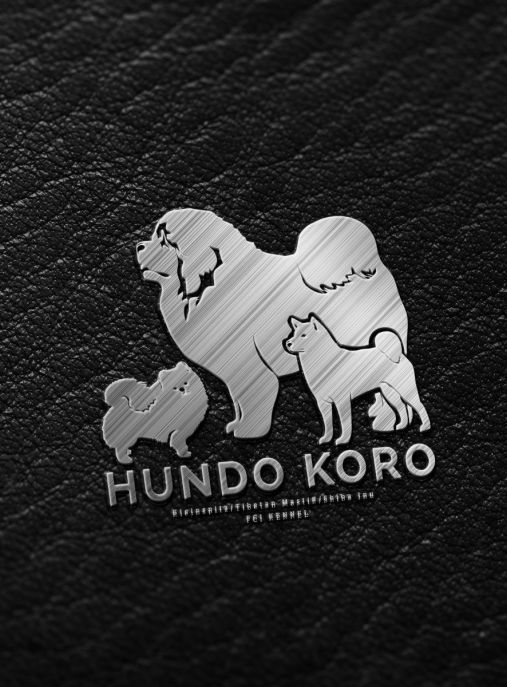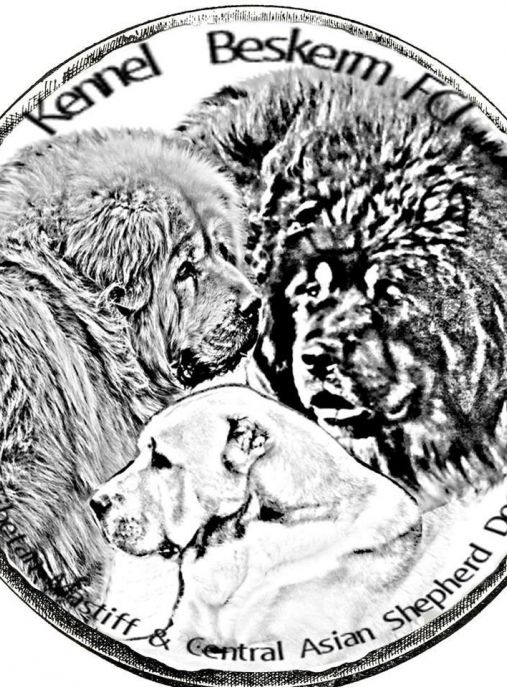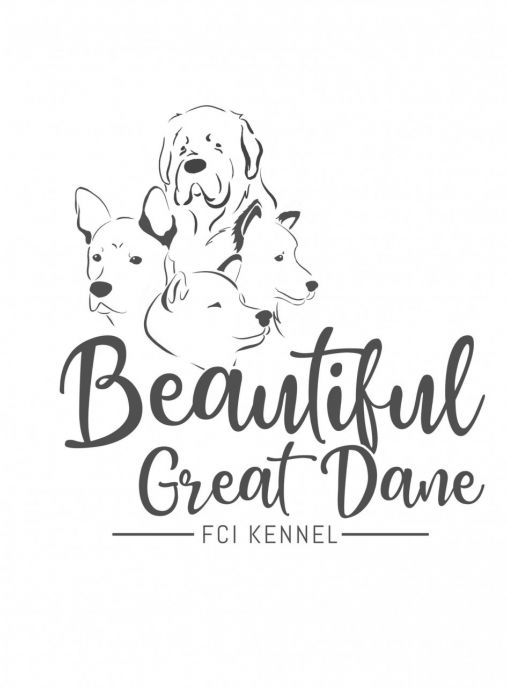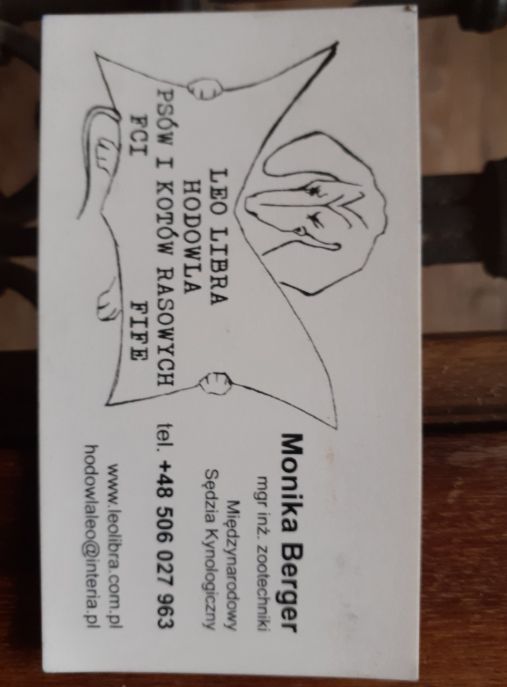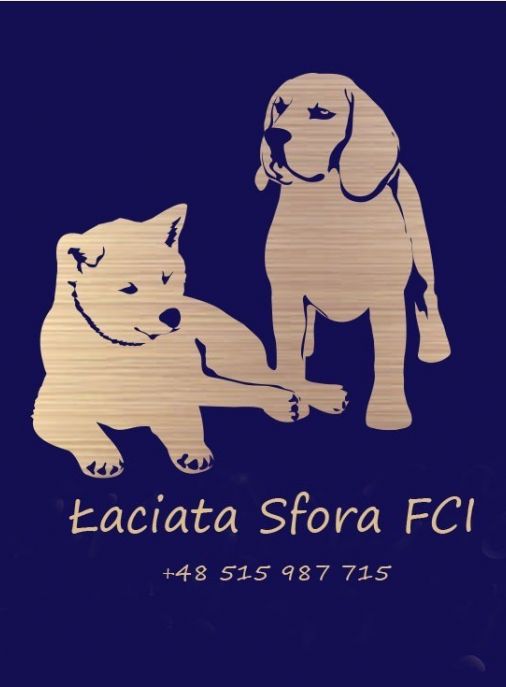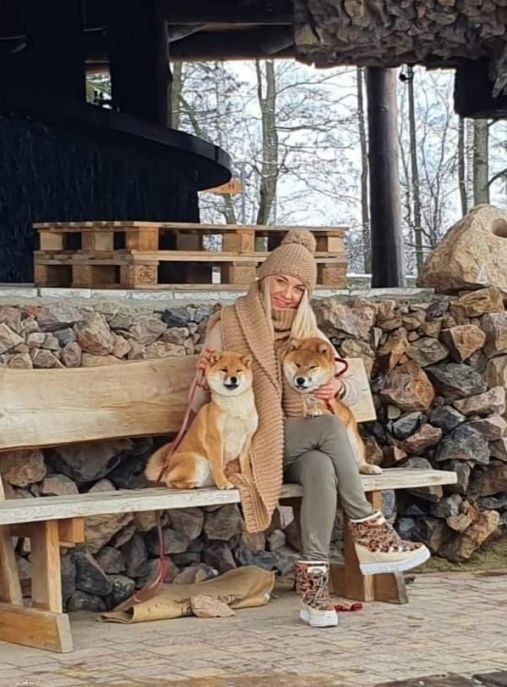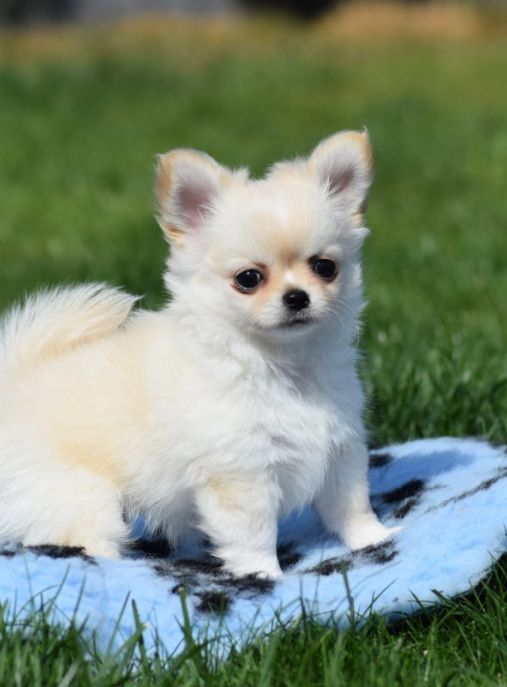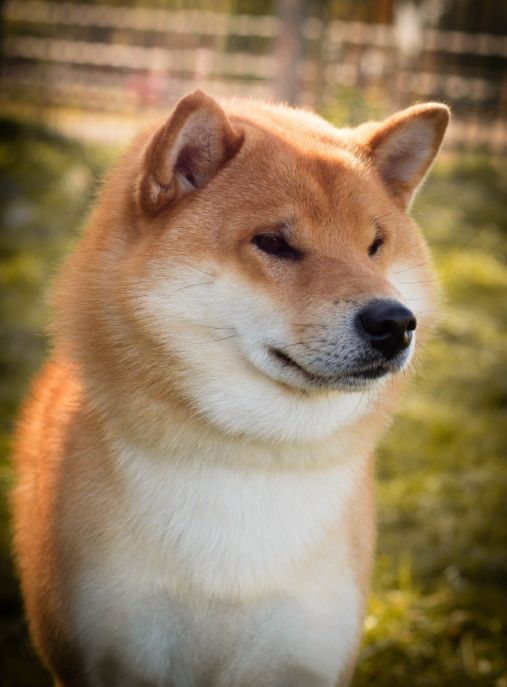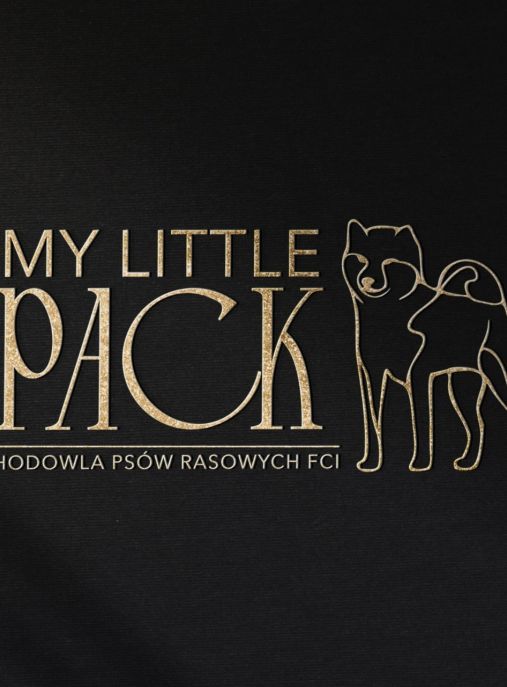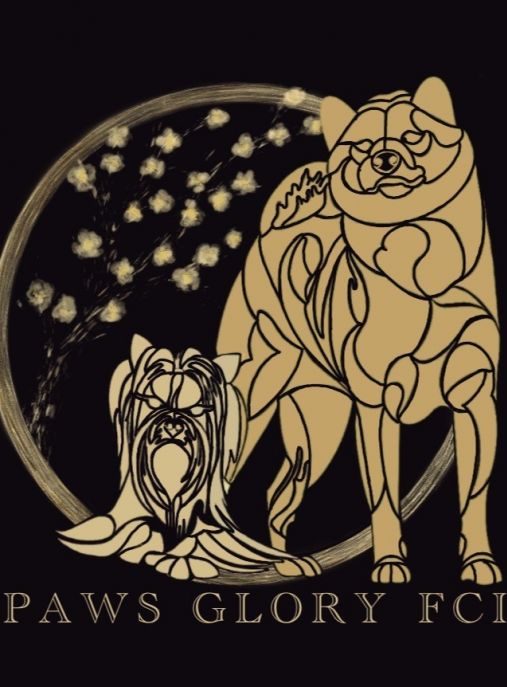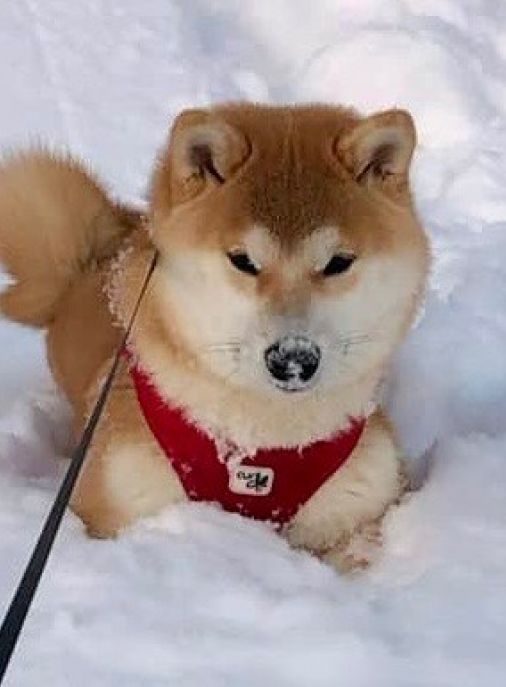The Shiba Inu, often referred to as the Shiba, is a small and ancient Japanese dog breed known for its spirited personality, fox-like appearance, and unwavering loyalty. This breed is considered one of the oldest and smallest native Japanese breeds, and its distinct characteristics have made it a beloved companion and symbol of Japan.
The history of the Shiba breed can be traced back thousands of years to ancient Japan. It is believed that the Shiba Inu's ancestors were brought to Japan from China around 2,000 years ago. These dogs were initially used for hunting small game, such as birds and rabbits, in the mountainous regions of Japan. Over time, the breed evolved and adapted to its surroundings, resulting in the development of the Shiba Inu we know today.
According to the FCI (Fédération Cynologique Internationale) typology, the Shiba Inu belongs to Group 5 - Spitz and Primitive types. This group includes other breeds such as the Akita Inu, Alaskan Malamute, and Siberian Husky. The Shiba Inu is classified under Section 5 - Asian Spitz and Related Breeds. This classification reflects the breed's close resemblance to other spitz-type dogs found in Asia.
Shiba Inus are primarily companion dogs and make excellent family pets. They are known for their independent and confident nature, which can sometimes be mistaken for stubbornness. While they may not be as eager to please their owners as some other breeds, their loyalty and affection are unwavering. Shiba Inus are known to form strong bonds with their families and are often protective of them.
In terms of physical characteristics, the Shiba Inu is a small to medium-sized dog. The average weight of a Shiba Inu ranges from 17 to 23 pounds (7.5 to 10.5 kilograms) for males and 15 to 20 pounds (6.5 to 9 kilograms) for females. Their height typically ranges from 13.5 to 16.5 inches (34 to 42 centimeters) at the shoulder. Despite their small size, Shiba Inus are well-muscled and have a sturdy build.
The life expectancy of a Shiba Inu is generally between 12 and 15 years, although some individuals have been known to live even longer with proper care. This breed is generally healthy, but like any dog, they can be prone to certain health issues. Some common health concerns for Shiba Inus include allergies, hip dysplasia, patellar luxation, and certain eye conditions. Regular veterinary check-ups and a balanced diet are essential for maintaining their overall well-being.
One interesting fact about Shiba Inus is their unique coat coloration. They come in a variety of colors, including red, sesame, black and tan, and cream. The most common color is red, which ranges from a vibrant orange-red to a deep mahogany. The sesame coloration is characterized by a mixture of black and red hairs, giving the coat a speckled appearance. The black and tan variety resembles the markings seen in other breeds like the Rottweiler or Doberman Pinscher. Lastly, the cream coloration is a pale off-white shade.
Another notable characteristic of the Shiba Inu is its expressive face, which often resembles that of a fox. They have small, triangular-shaped ears that stand erect and almond-shaped eyes that are dark and alert. Their tail is thick and curls over their back, adding to their overall fox-like appearance. This unique combination of physical traits gives the Shiba Inu a distinct and captivating charm.
In conclusion, the Shiba Inu is a remarkable and ancient breed that has captured the hearts of many dog enthusiasts worldwide. With its rich history, spirited personality, and striking appearance, the Shiba Inu continues to be a cherished companion and a symbol of Japanese culture. Whether as a loyal family pet or a beloved show dog, the Shiba Inu's unique qualities make it a breed like no other.

The Shiba Inu, a small and spirited breed originating from Japan, is known for its distinct character and unique personality traits. These dogs possess a combination of independence, intelligence, and loyalty that sets them apart from other breeds. Understanding the character of Shiba dogs is crucial for successfully raising and training them.
Shiba Inus are often described as confident and self-assured. They have a strong sense of individuality and are not afraid to assert themselves. This independent nature can sometimes make them appear aloof or even stubborn. However, it is important to note that this does not mean they are unaffectionate. Shiba dogs are known to form deep bonds with their families and can be quite loving and loyal.
One of the most fascinating aspects of the Shiba Inu's character is their intelligence. These dogs are highly intelligent and have a keen problem-solving ability. They are quick learners and can easily pick up new commands and tricks. However, their intelligence can also make them mischievous at times. Shiba Inus are known for their mischievous nature and can be quite creative in finding ways to entertain themselves.
When it comes to training, Shiba Inus require a firm and consistent approach. Due to their independent nature, they may not always be eager to please their owners. Positive reinforcement techniques, such as treats and praise, work best with this breed. Harsh training methods or excessive force can lead to resistance and may even damage the trust between the dog and its owner.
Socialization is another crucial aspect of raising a Shiba Inu. Early and ongoing socialization is essential to ensure they grow up to be well-rounded dogs. Exposing them to various people, animals, and environments from a young age helps them develop good manners and prevents them from becoming overly protective or aggressive.
Shiba Inus have a strong prey drive, which means they may have a tendency to chase small animals. It is important to keep them on a leash or in a securely fenced area to prevent them from running off after squirrels or other small creatures. Additionally, their independent nature can make them prone to wandering, so it is essential to have a secure yard or use a leash during walks.
Exercise is vital for Shiba Inus to maintain their physical and mental well-being. These dogs have a lot of energy and require regular exercise to prevent boredom and destructive behavior. Daily walks, playtime, and mental stimulation activities, such as puzzle toys or obedience training, are essential to keep them happy and content.
In conclusion, Shiba Inus possess a unique character that requires understanding and patience. Their independent nature, intelligence, and loyalty make them a fascinating breed to raise and train. With consistent training, early socialization, and plenty of exercise, Shiba Inus can become well-behaved and loving companions for those who appreciate their spirited personality.
The Shiba Inu is a beautiful and spirited breed of dog that requires specific care to ensure their health and happiness. Here are some tips on how to care for Shiba dogs, including what to do and what not to do:
1. Exercise: Shiba Inus are an active breed that requires regular exercise to keep them physically and mentally stimulated. Daily walks, playtime, and interactive toys are essential to prevent boredom and destructive behavior. However, avoid overexertion, especially in hot weather, as Shibas are prone to heatstroke.
2. Grooming: Shibas have a thick double coat that sheds heavily twice a year. Regular brushing is necessary to remove loose hair and prevent matting. During shedding seasons, daily brushing is recommended. However, avoid excessive bathing as it can strip their coat of natural oils. Trim their nails regularly and clean their ears to prevent infections.
3. Training: Shibas are intelligent but independent dogs, which can make training a challenge. Start training early and be consistent, using positive reinforcement techniques such as treats and praise. Socialization is crucial to prevent aggression towards other dogs and strangers. However, avoid off-leash areas as Shibas have a strong prey drive and may chase small animals.
4. Feeding: Provide a balanced and high-quality diet suitable for Shibas' age, size, and activity level. Measure their food to prevent overeating, as Shibas are prone to obesity. Avoid feeding them table scraps or foods that are toxic to dogs, such as chocolate, onions, and grapes. Additionally, be cautious with treats, as Shibas can be prone to food allergies.
5. Health care: Regular veterinary check-ups are essential to monitor your Shiba's overall health. Vaccinations, parasite prevention, and dental care should be part of their routine. Shibas are generally a healthy breed, but they can be prone to certain conditions like allergies, hip dysplasia, and patellar luxation. Stay vigilant for any signs of illness or discomfort and seek veterinary attention promptly.
6. Safety: Shibas are known for their escape artist tendencies, so it's crucial to have a secure and fenced yard. They are also skilled climbers, so ensure fences are high enough to prevent them from jumping over. Shibas should always be kept on a leash during walks to prevent them from running off. Additionally, be cautious with open doors or windows, as Shibas may try to bolt outside.
7. Mental stimulation: Shibas are highly intelligent dogs that require mental stimulation to prevent boredom and destructive behavior. Puzzle toys, interactive games, and obedience training sessions can help keep their minds engaged. Shibas also enjoy activities like agility, nose work, and obedience trials.
What not to do:
1. Do not leave your Shiba alone for extended periods. They are a social breed and can become anxious or develop separation anxiety if left alone for too long.
2. Do not use harsh training methods or punishment. Shibas respond best to positive reinforcement techniques and consistency.
3. Do not ignore their exercise needs. Lack of physical activity can lead to behavioral issues and weight gain.
4. Do not neglect their dental care. Regular teeth brushing and dental check-ups are essential to prevent dental diseases.
5. Do not let them off-leash in unsecured areas. Shibas have a strong prey drive and may chase after small animals or become difficult to catch if they decide to run off.
Remember, caring for a Shiba Inu requires dedication, patience, and understanding of their unique traits. By providing them with proper care, training, and love, you can ensure a happy and fulfilling life for your Shiba companion.
The Shiba Inu, a small and spirited breed originating from Japan, is known for its distinctive and captivating coat. The common color of Shiba dogs is a rich and vibrant red, often referred to as "red sesame." This unique hue is a defining characteristic of the breed and adds to their overall charm and allure.
The red sesame color of Shiba dogs is a captivating blend of various shades and tones. The base color is a deep, reddish-brown, reminiscent of autumn leaves. This warm and earthy tone is beautifully complemented by lighter highlights, creating a stunning contrast that catches the eye. The lighter shades can range from a golden tan to a creamy white, adding depth and dimension to the coat.
The red sesame color is not uniform throughout the dog's body. The back, sides, and top of the tail typically showcase the darker red-brown hue, while the chest, belly, and underside of the tail tend to have more of the lighter tones. This variation in color distribution gives the Shiba dog a striking appearance and enhances their overall elegance.
The coat of a Shiba dog is dense, plush, and double-layered, providing them with protection against various weather conditions. The outer coat is straight and coarse, while the undercoat is soft and thick. This combination of textures adds to the visual appeal of the red sesame color, as it creates a beautiful contrast between the two layers.
In addition to the red sesame color, Shiba dogs can also come in other colors, including black sesame, sesame, and cream. Black sesame Shibas have a similar color pattern to red sesame Shibas but with a black base instead of red. Sesame Shibas have a mix of black and red hairs, creating a speckled appearance. Cream Shibas, on the other hand, have a lighter, cream-colored coat.
The red sesame color of Shiba dogs not only adds to their aesthetic appeal but also reflects their spirited and fiery personality. It symbolizes their strong-willed nature, loyalty, and independence. This color, combined with their alert expression and confident demeanor, makes Shiba dogs truly captivating and unique.
Whether they are frolicking in the park, exploring their surroundings, or simply lounging at home, Shiba dogs with their red sesame coats are sure to turn heads and capture the hearts of all who encounter them. Their striking color is a testament to their beauty, strength, and individuality, making them a beloved breed among dog enthusiasts worldwide.
The Shiba Inu, a small and spirited breed originating from Japan, is known for its charming appearance and lively personality. While generally a healthy breed, Shiba dogs are prone to certain health issues that owners should be aware of. By understanding these common diseases and implementing proper care, you can ensure the well-being of your beloved Shiba companion.
One of the most prevalent health concerns in Shiba Inus is allergies. These can manifest as skin irritations, itching, and excessive licking. Allergies can be triggered by various factors such as food, environmental allergens like pollen or dust mites, or even certain grooming products. Regularly bathing your Shiba with hypoallergenic shampoos and using allergen-free bedding can help alleviate these symptoms. Additionally, working with your veterinarian to identify and eliminate potential allergens from their diet can greatly improve their overall health.
Another common issue in Shiba Inus is patellar luxation, a condition where the kneecap dislocates from its normal position. This can cause lameness, pain, and difficulty in walking. Regular exercise and maintaining a healthy weight can help prevent this condition. If your Shiba shows signs of limping or discomfort, consult with a veterinarian who may recommend physical therapy, medication, or in severe cases, surgery.
Progressive Retinal Atrophy (PRA) is an inherited eye disorder that affects Shiba Inus. PRA causes a gradual degeneration of the retina, leading to vision loss and eventual blindness. Regular eye examinations by a veterinary ophthalmologist can help detect this condition early on. While there is no cure for PRA, supportive care and environmental modifications can help your Shiba adapt to their changing vision.
Shiba Inus are also prone to certain genetic conditions, such as hip dysplasia and hypothyroidism. Hip dysplasia occurs when the hip joint doesn't develop properly, leading to pain and mobility issues. Regular exercise, maintaining a healthy weight, and providing joint supplements can help manage this condition. Hypothyroidism, on the other hand, is a hormonal disorder that affects the thyroid gland, leading to weight gain, lethargy, and skin problems. Regular blood tests can help diagnose and manage this condition through medication and dietary adjustments.
To ensure the overall health of your Shiba Inu, regular veterinary check-ups are essential. Vaccinations, parasite prevention, and dental care should be a part of their routine healthcare. Proper nutrition is also crucial, as Shiba Inus can be prone to obesity. Feeding them a balanced diet, portion control, and avoiding excessive treats can help maintain a healthy weight.
Exercise is vital for a Shiba's physical and mental well-being. Daily walks, playtime, and mental stimulation through puzzle toys or training sessions are necessary to prevent boredom and destructive behavior. However, it's important to note that Shiba Inus have a strong prey drive and should be kept on a leash or in a securely fenced area to prevent them from chasing small animals.
In conclusion, while Shiba Inus are generally healthy dogs, they are predisposed to certain health conditions. By being aware of these common diseases and providing proper care, you can ensure a long and happy life for your Shiba companion. Regular veterinary check-ups, a balanced diet, exercise, and a loving environment are key to maintaining their overall health and well-being.
Shiba dogs, known for their spirited and independent nature, require a well-balanced and nutritious diet to maintain their overall health and vitality. Proper nutrition plays a crucial role in supporting their energy levels, promoting a healthy coat, and ensuring optimal growth and development. In this text, we will delve into the specific dietary needs of Shiba dogs, offering advice on what to feed them and what to avoid.
First and foremost, it is essential to provide Shiba dogs with a high-quality dog food that is specifically formulated for their breed size and age. Look for dog food brands that use real meat as the primary ingredient, such as chicken, beef, or fish. Avoid foods that contain excessive fillers, by-products, or artificial additives, as these can be detrimental to their overall health.
Shiba dogs thrive on a diet that is rich in protein, as it supports their lean muscle mass and provides them with the necessary energy. Aim for a dog food that contains at least 25-30% protein content. Additionally, ensure that the food contains a moderate amount of healthy fats, which are essential for maintaining their skin and coat health. Omega-3 fatty acids, found in fish oil or flaxseed, are particularly beneficial for Shiba dogs.
While commercial dog food forms the foundation of their diet, it is also important to incorporate fresh and natural foods into their meals. Adding small amounts of cooked lean meats, such as chicken or turkey, can provide additional protein and variety to their diet. Similarly, steamed vegetables like carrots, green beans, or broccoli can offer essential vitamins and minerals.
When it comes to feeding Shiba dogs, it is crucial to establish a regular feeding schedule. Adult Shibas typically require two meals per day, while puppies may need three to four smaller meals. Avoid free-feeding or leaving food out all day, as it can lead to overeating and weight gain. Instead, measure out the appropriate portion sizes based on their age, weight, and activity level.
It is important to note that Shiba dogs have a tendency to gain weight easily, so portion control is vital. Obesity can lead to various health issues, including joint problems and heart disease. Monitor their weight regularly and adjust their food intake accordingly. If you notice your Shiba gaining weight, consult with a veterinarian to determine the appropriate portion sizes and make any necessary dietary changes.
While Shiba dogs can enjoy a wide variety of foods, there are certain items that should be avoided. Chocolate, caffeine, grapes, raisins, onions, garlic, and foods containing xylitol are toxic to dogs and can cause serious health problems. Additionally, avoid feeding them fatty or fried foods, as these can lead to digestive issues and pancreatitis.
Lastly, always ensure that your Shiba has access to fresh, clean water throughout the day. Hydration is crucial for their overall well-being and helps maintain proper organ function.
In conclusion, providing a well-balanced and nutritious diet is essential for the health and happiness of Shiba dogs. Choose high-quality dog food, incorporate fresh and natural foods, establish a regular feeding schedule, and monitor their weight to prevent obesity. By following these guidelines and avoiding harmful foods, you can ensure that your Shiba dog thrives and enjoys a long and healthy life.




